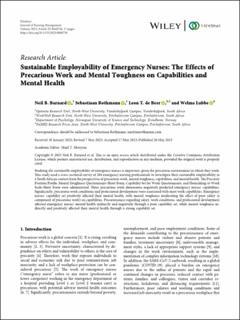Sustainable Employability of Emergency Nurses: The Effects of Precarious Work and Mental Toughness on Capabilities and Mental Health
Peer reviewed, Journal article
Published version
Date
2023Metadata
Show full item recordCollections
- Institutt for psykologi [2902]
- Publikasjoner fra CRIStin - NTNU [37384]
Abstract
Studying the sustainable employability of emergency nurses is important, given the precarious environment in which they work. This study used a cross-sectional survey of 204 emergency nursing professionals to investigate their sustainable employability in a South African context from the perspectives of precarious work, mental toughness, capabilities, and mental health. The Precarity Position Profile, Mental Toughness Questionnaire-Short Form, Capability Set for Work Questionnaire, and Flourishing-at-Work Scale-Short Form were administered. Three precarious work dimensions negatively predicted emergency nurses’ capabilities. Significantly, precarious work conditions and professional development were associated with most work capabilities. Emergency nurses’ capability set positively affected their mental health, with mental toughness moderating the effect of poor salary (a component of precarious work) on capabilities. Precariousness regarding salary, work conditions, and professional development affected emergency nurses’ mental health indirectly and negatively through a poor capability set, while mental toughness indirectly and positively affected their mental health through a strong capability set.

